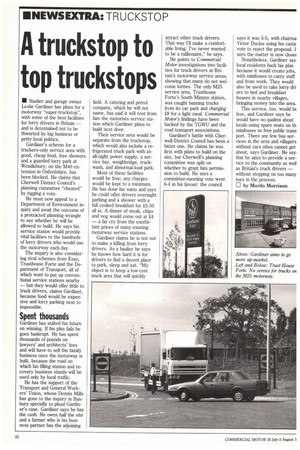A truckstop to top truckstops
Page 20

If you've noticed an error in this article please click here to report it so we can fix it.
II Haulier and garage owner Leslie Gardiner has plans for a motorway "super-truckstop", with some of the best facilities for lorry drivers in Britain — and is determined not to be thwarted by big business or petty local politics.
Gardiner's scheme for a truckers-only service area with good, cheap food, free showers and a guarded lorry park at Wendlebury, on the M40 extension in Oxfordshire, has been blocked. He claims that Cherwell District Council's planning committee "cheated" by rigging a vote.
He must now appeal to a Department of Environment inquiry and await the outcome of a protracted planning wrangle to see whether he will be allowed to build. He says his service station would provide vital facilities to the hundreds of lorry drivers who would use the motorway each day.
The inquiry is also considering rival schemes from Esso, Trusthouse Forte and the Department of Transport, all of which want to put up conventional service stations nearby — but they would offer little to truck drivers, claims Gardiner, because food would be expensive and lorry parking next to impossible.
Spent thousands
Gardiner has staked his future on winning. If his plan fails he goes bankrupt He has spent thousands of pounds on lawyers' and architects' fees and will have to sell the family business once the motorway is built, because the road on which his filling station and recovery business stands will be used only by local traffic.
He has the support of the Transport and General Workers' Union, whose Dennis Mills has gone to the inquiry in Banbury specially to plead Gardiner's case. Gardiner says he has the cash. He owns half the site and a farmer who is his business partner has the adjoining field. A catering and petrol company, which he will not name, has said it will rent from him the motorists service station which Gardiner plans to build next door.
Their service area would be separate from the truckstop, which would also include a refrigerated truck park with an all-night power supply, a service bay, weighbridge, truckwash, and abnormal-load park.
Most of these facilities would be free; any charges would be kept to a minimum. He has done his sums and says he could offer drivers overnight parking and a shower with a full cooked breakfast for 23.50 all in. A dinner of steak, chips and veg would come out at 24 — a far cry from the exorbitant prices of many existing motorway service stations.
Gardiner claims he is not out to make a killing from lorry drivers. As a haulier he says he knows how hard it is for drivers to find a decent place to park, sleep and eat "My object is to keep a low-cost truck area that will quickly attract other truck drivers. That way I'll make a comfortable living. I've never wanted to be a millionaire," he says.
He points to Commercial Motor investigations into facilities for truck drivers at Britain's motorway service areas, showing that many do not welcome lorries. The only M25 service area, Tntsthouse Forte's South Minims station, was caught banning trucks from its car park and charging 28 for a light meal. Commercial Motor's findings have been backed by the TGWU and the road transport associations.
Gardiner's battle with Cherwell District Council has been a bitter one. He claims he was first with plans to build on the site, but Cherwell's planning committee was split on whether to grant him permission to build. He says a committee-meeting vote went 6-4 in his favour: the council says it was 5-5, with chairma Victor Duclos using his castir vote to reject the proposal. II says the matter is now closet Nonetheless, Gardiner say: local residents back his plan because it would create jobs, with minibuses to carry staff and from work. They would also be used to take lorry drt ers to bed and breakfast houses in nearby villages, bringing money into the area.
This service, too, would bi free, and Gardiner says he would have no qualms about locals using spare seats on th minibuses as free public trans port. There are few bus services in the area and villagers without cars often cannot get about, says Gardiner. He say that he aims to provide a service to the community as well as Britain's truck drivers — without stepping on too many toes in the process.
by Murdo Morrison








































































